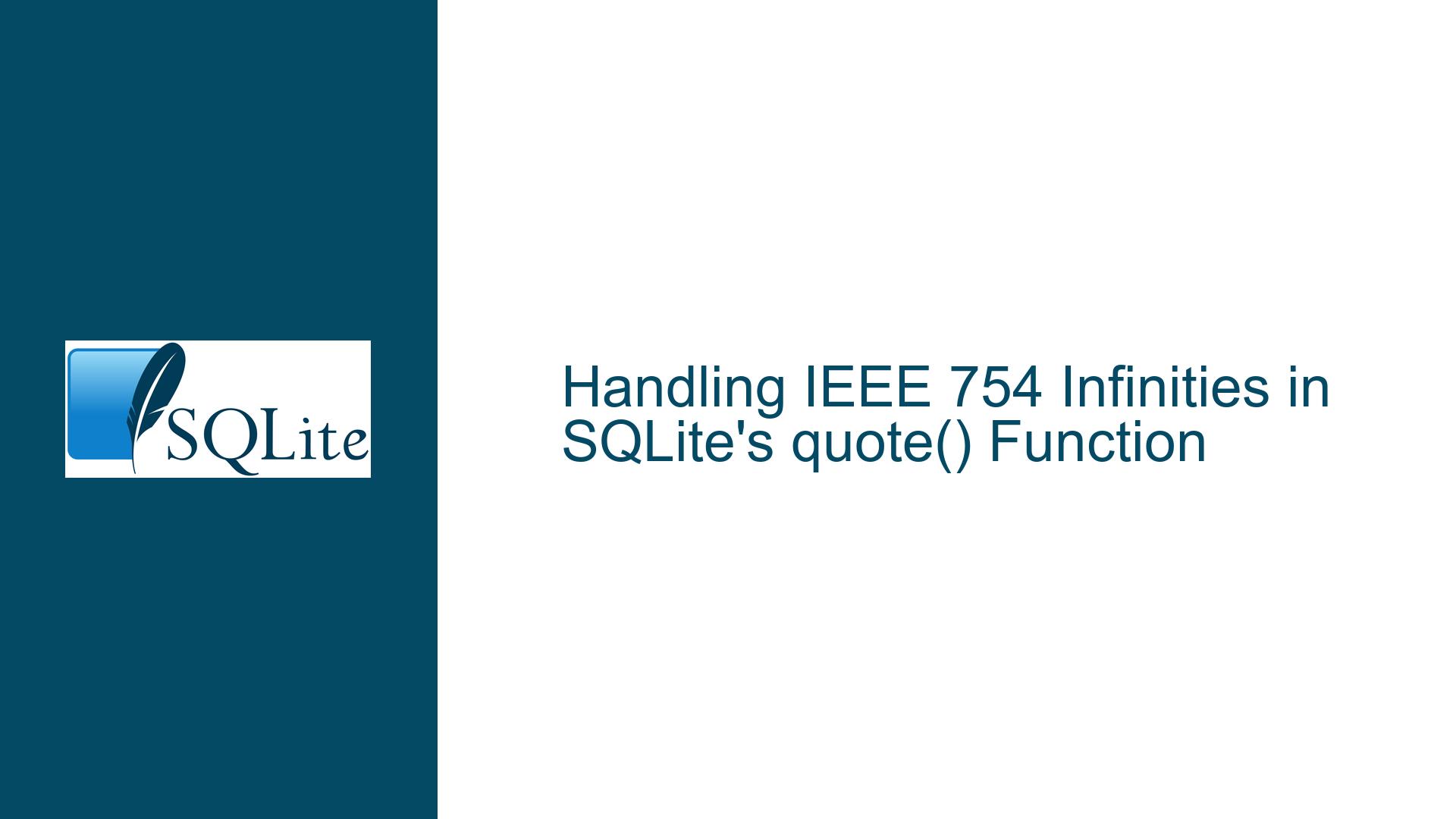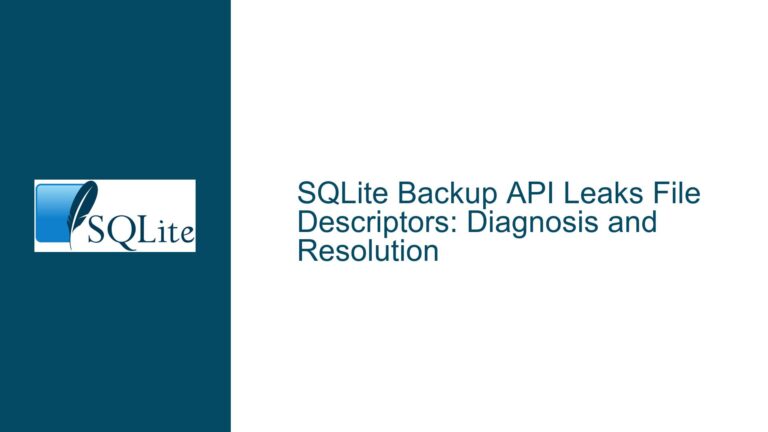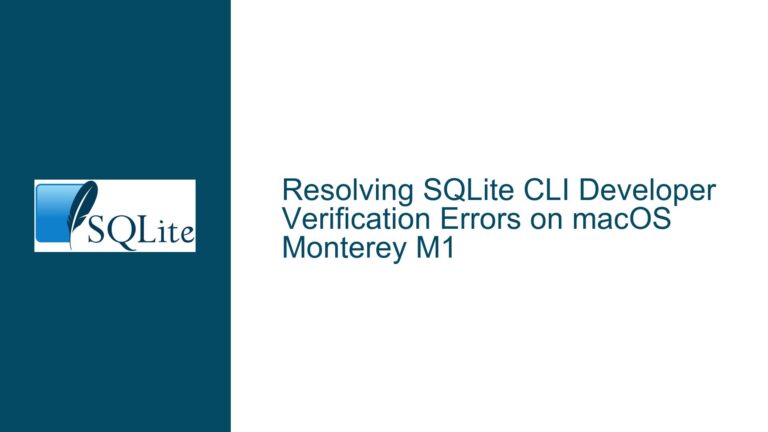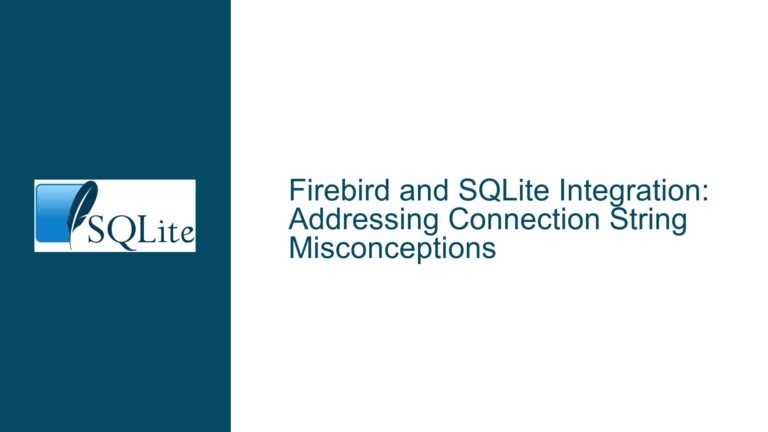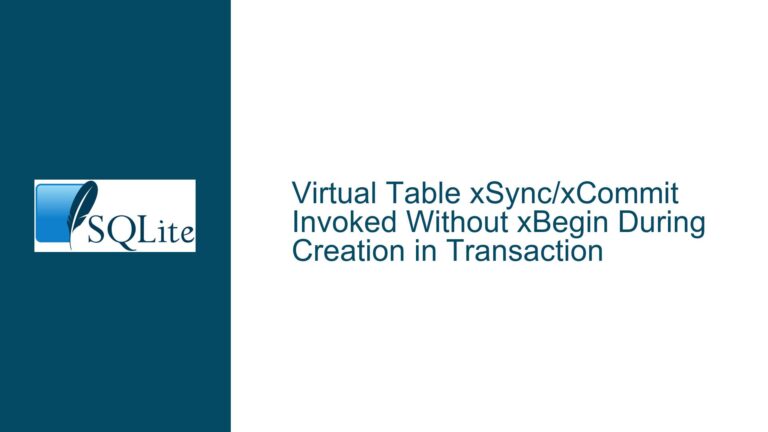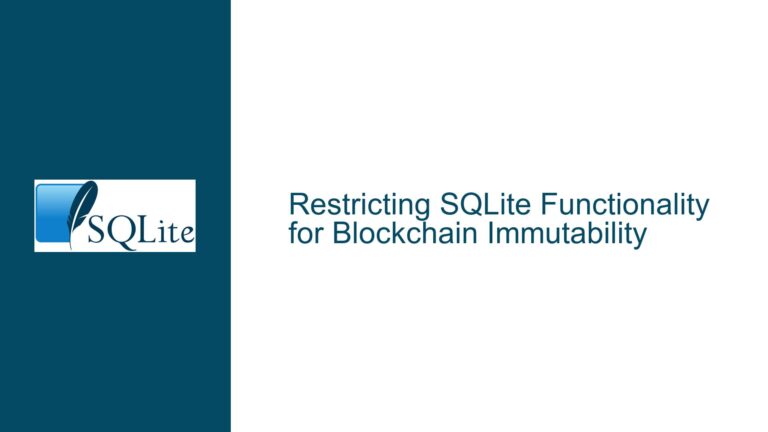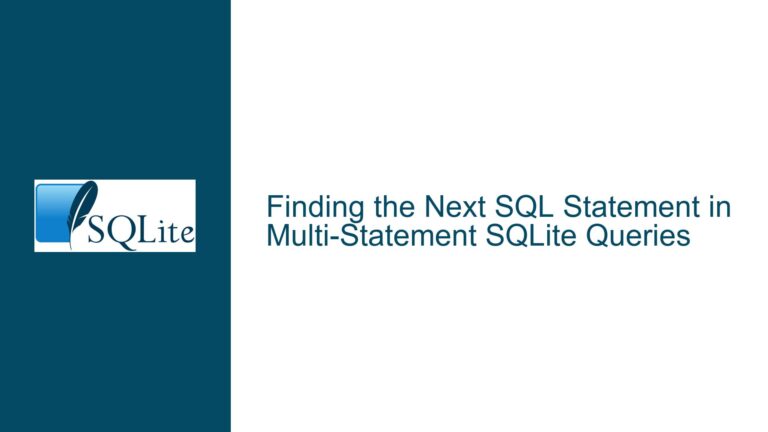Handling IEEE 754 Infinities in SQLite’s quote() Function
IEEE 754 Infinities and Their Representation in SQLite
The issue at hand revolves around the representation of IEEE 754 infinities in SQLite, specifically within the context of the quote() function and the CLI .dump command. IEEE 754 is a technical standard for floating-point arithmetic, which defines how floating-point numbers are represented in computer systems. This standard includes representations for positive and negative infinity, which are special values that arise when a calculation exceeds the maximum representable value or when a division by zero occurs.
In SQLite, the quote() function is used to return a string that is the SQL literal representation of its argument. This function is particularly useful when you need to generate SQL statements dynamically or when you want to ensure that a value is properly escaped for use in SQL queries. However, the current implementation of quote() outputs 'Inf' for IEEE 754 infinity, whereas the CLI .dump command produces '1e999'. This discrepancy can lead to inconsistencies when working with floating-point infinities in SQLite.
The core of the problem lies in the format strings used by the sqlite3QuoteValue() function in src/func.c. The format strings "%!.15g" and "%!.20e" are currently used to format floating-point numbers, but they do not handle IEEE 754 infinities in a way that is consistent with the CLI .dump command. The suggestion is to modify these format strings to "%!0.15g" and "%!0.20e" respectively, which would make use of special-value handling in printf() to produce a similar result without altering float formatting otherwise.
Possible Causes of the Inconsistency
The inconsistency in the representation of IEEE 754 infinities between the quote() function and the CLI .dump command can be attributed to several factors. First, the quote() function and the CLI .dump command may be using different internal mechanisms to format floating-point numbers. The quote() function relies on the sqlite3QuoteValue() function, which uses format strings to convert floating-point numbers to their string representations. On the other hand, the CLI .dump command may be using a different set of format strings or a different approach altogether to format floating-point numbers.
Another possible cause is the way the printf() function handles special values like IEEE 754 infinities. The printf() function is a standard library function that formats and prints data to the standard output. It uses format strings to specify how the data should be formatted. The format strings "%!.15g" and "%!.20e" used by sqlite3QuoteValue() may not be handling IEEE 754 infinities in the same way as the format strings used by the CLI .dump command. This could be due to differences in the implementation of printf() across different platforms or due to differences in the way the format strings are interpreted.
Additionally, the quote() function and the CLI .dump command may have different requirements for the representation of floating-point numbers. The quote() function is designed to produce SQL literals, which need to be valid SQL syntax. The CLI .dump command, on the other hand, is designed to produce a human-readable representation of the database schema and data. These different requirements may lead to different representations of IEEE 754 infinities.
Troubleshooting Steps, Solutions & Fixes
To address the inconsistency in the representation of IEEE 754 infinities between the quote() function and the CLI .dump command, several steps can be taken. First, it is important to understand the current behavior of the quote() function and the CLI .dump command. This can be done by examining the source code of SQLite, specifically the sqlite3QuoteValue() function in src/func.c and the code responsible for the CLI .dump command.
Once the current behavior is understood, the next step is to identify the format strings used by both the quote() function and the CLI .dump command. The format strings "%!.15g" and "%!.20e" used by sqlite3QuoteValue() should be compared to the format strings used by the CLI .dump command. If the format strings are different, they should be modified to ensure consistency in the representation of IEEE 754 infinities.
The suggestion to modify the format strings to "%!0.15g" and "%!0.20e" is a good starting point. These format strings make use of special-value handling in printf(), which should produce a consistent representation of IEEE 754 infinities. However, it is important to test these changes thoroughly to ensure that they do not introduce any new issues or inconsistencies.
Testing should involve creating a test database with floating-point numbers that include IEEE 754 infinities. The quote() function and the CLI .dump command should be used to generate SQL literals and database dumps, respectively. The output should be compared to ensure that the representation of IEEE 754 infinities is consistent between the two.
If the changes to the format strings do not resolve the inconsistency, further investigation may be required. This could involve examining the implementation of printf() on the platform where SQLite is running. Different platforms may have different implementations of printf(), which could affect the way IEEE 754 infinities are formatted. In such cases, it may be necessary to implement custom formatting logic for IEEE 754 infinities in SQLite.
Another approach is to introduce a new configuration option in SQLite that allows users to specify how IEEE 754 infinities should be represented. This option could be used to ensure consistency between the quote() function and the CLI .dump command. The configuration option could be implemented as a new pragma or as a compile-time option.
In addition to modifying the format strings and introducing a configuration option, it is also important to document the behavior of the quote() function and the CLI .dump command with respect to IEEE 754 infinities. The SQLite documentation should clearly state how IEEE 754 infinities are represented and any differences between the quote() function and the CLI .dump command. This will help users understand the behavior and avoid potential issues when working with floating-point infinities in SQLite.
Finally, it is important to consider the impact of these changes on existing applications that use SQLite. Any changes to the representation of IEEE 754 infinities could potentially break existing code that relies on the current behavior. Therefore, it is important to provide a migration path for users who need to update their applications to work with the new representation of IEEE 754 infinities. This could involve providing a compatibility mode that preserves the old behavior or providing tools to help users update their code.
In conclusion, the inconsistency in the representation of IEEE 754 infinities between the quote() function and the CLI .dump command in SQLite can be addressed by modifying the format strings used by sqlite3QuoteValue(), introducing a configuration option, and thoroughly testing the changes. It is also important to document the behavior and provide a migration path for existing applications. By taking these steps, SQLite can ensure consistent and reliable handling of IEEE 754 infinities, which will benefit users who work with floating-point numbers in their databases.
